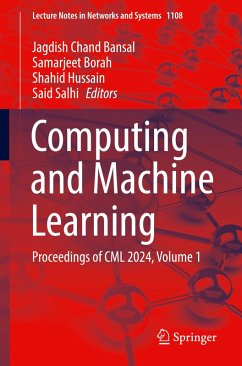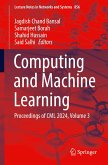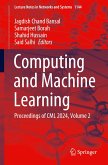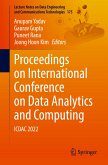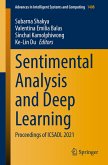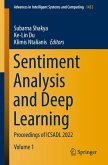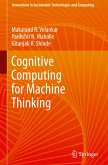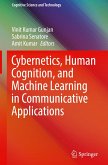Computing and Machine Learning
Proceedings of CML 2024, Volume 1
Herausgegeben:Bansal, Jagdish Chand; Borah, Samarjeet; Hussain, Shahid; Salhi, Said
Computing and Machine Learning
Proceedings of CML 2024, Volume 1
Herausgegeben:Bansal, Jagdish Chand; Borah, Samarjeet; Hussain, Shahid; Salhi, Said
- Broschiertes Buch
- Merkliste
- Auf die Merkliste
- Bewerten Bewerten
- Teilen
- Produkt teilen
- Produkterinnerung
- Produkterinnerung
This book features high-quality research papers presented at the International Conference on Computing and Machine Learning (CML 2024), organized by the Department of Computer Applications, Sikkim Manipal Institute of Technology, Sikkim Manipal University, Sikkim, India during April 29-30, 2024. The book presents diverse range of topics, including machine learning algorithms and models, deep learning and neural networks, computer vision and image processing, natural language processing, robotics and automation, reinforcement learning, big data analytics, cloud computing, Internet of things,…mehr
Andere Kunden interessierten sich auch für
![Computing and Machine Learning Computing and Machine Learning]() Computing and Machine Learning186,99 €
Computing and Machine Learning186,99 €![Computing and Machine Learning Computing and Machine Learning]() Computing and Machine Learning164,99 €
Computing and Machine Learning164,99 €![Proceedings on International Conference on Data Analytics and Computing Proceedings on International Conference on Data Analytics and Computing]() Proceedings on International Conference on Data Analytics and Computing186,99 €
Proceedings on International Conference on Data Analytics and Computing186,99 €![Sentimental Analysis and Deep Learning Sentimental Analysis and Deep Learning]() Sentimental Analysis and Deep Learning171,99 €
Sentimental Analysis and Deep Learning171,99 €![Sentiment Analysis and Deep Learning Sentiment Analysis and Deep Learning]() Sentiment Analysis and Deep Learning176,99 €
Sentiment Analysis and Deep Learning176,99 €![Cognitive Computing for Machine Thinking Cognitive Computing for Machine Thinking]() Makarand R. VelankarCognitive Computing for Machine Thinking112,99 €
Makarand R. VelankarCognitive Computing for Machine Thinking112,99 €![Cybernetics, Human Cognition, and Machine Learning in Communicative Applications Cybernetics, Human Cognition, and Machine Learning in Communicative Applications]() Cybernetics, Human Cognition, and Machine Learning in Communicative Applications149,99 €
Cybernetics, Human Cognition, and Machine Learning in Communicative Applications149,99 €-
-
-
This book features high-quality research papers presented at the International Conference on Computing and Machine Learning (CML 2024), organized by the Department of Computer Applications, Sikkim Manipal Institute of Technology, Sikkim Manipal University, Sikkim, India during April 29-30, 2024. The book presents diverse range of topics, including machine learning algorithms and models, deep learning and neural networks, computer vision and image processing, natural language processing, robotics and automation, reinforcement learning, big data analytics, cloud computing, Internet of things, human-robot interaction, ethical and social implications of AI, applications in healthcare, finance, and industry, computer modeling, quantum computing, high-performance computing, cognitive and parallel computing, cloud computing, distributed computing, embedded computing, human-centered computing, and mobile computing.
Produktdetails
- Produktdetails
- Lecture Notes in Networks and Systems 1108
- Verlag: Springer / Springer Nature Singapore / Springer, Berlin
- Artikelnr. des Verlages: 978-981-97-6587-4
- Seitenzahl: 532
- Erscheinungstermin: 23. Oktober 2024
- Englisch
- Abmessung: 235mm x 155mm x 27mm
- Gewicht: 894g
- ISBN-13: 9789819765874
- ISBN-10: 9819765870
- Artikelnr.: 71220616
- Herstellerkennzeichnung
- Springer-Verlag GmbH
- Tiergartenstr. 17
- 69121 Heidelberg
- ProductSafety@springernature.com
- Lecture Notes in Networks and Systems 1108
- Verlag: Springer / Springer Nature Singapore / Springer, Berlin
- Artikelnr. des Verlages: 978-981-97-6587-4
- Seitenzahl: 532
- Erscheinungstermin: 23. Oktober 2024
- Englisch
- Abmessung: 235mm x 155mm x 27mm
- Gewicht: 894g
- ISBN-13: 9789819765874
- ISBN-10: 9819765870
- Artikelnr.: 71220616
- Herstellerkennzeichnung
- Springer-Verlag GmbH
- Tiergartenstr. 17
- 69121 Heidelberg
- ProductSafety@springernature.com
Dr. Jagdish Chand Bansal is an associate professor (Senior Grade) at South Asian University, New Delhi, and a visiting faculty at Maths and Computer Science, Liverpool Hope University, UK. He also holds visiting professorship at NIT Goa, India. Dr. Bansal obtained his Ph.D. in Mathematics from IIT Roorkee. Before joining SAU New Delhi, he worked as an assistant professor at ABV-Indian Institute of Information Technology and Management Gwalior and BITS Pilani. His primary areas of interest are swarm intelligence and nature-inspired optimization techniques. Recently, he proposed a fission-fusion social structure-based optimization algorithm, spider monkey optimization (SMO), which is being applied to various problems in the engineering domain. He has published over 70 research papers in various international journals/conferences. Dr. Samarjeet Borah is currently working as a professor and the head of the Department of Computer Applications, SMIT, Sikkim Manipal University (SMU), Sikkim, India. Dr. Borah has carried out various funded projects from AICTE (GoI), DST-CSRI (GoI), etc. He has published around 90 research papers in various journals and conferences. He has organized various workshops and conferences in national and international levels. Dr. Borah is involved with various book volumes and journals of repute from Springer, IEEE, Inderscience, and IGI Global as a editor or guest editor. He is the editor-in-chief of the book and proceedings series-Research Notes on Computing and Communication Sciences, Apple Academic Press, USA. Dr. Borah has served as a keynote as well as invited speaker in several international conferences. His areas of research are data mining, information security, data science, and machine learning. Professor Said Salhi has been an emeritus professor in Operational Research/Management Science at the Kent Business School (UK) since January 2021. Prior to his appointment as a full professor to Kent in 2005, he was at the University of Birmingham in the School of Mathematics for 15 years (lecturer, senior lecturer, and reader), and in his later three years, he acted as the head of the Management Mathematics Group. In Kent, he was also the head of the Management Science Group for over 8 years (2008-May 2017), founder and designer of the M.Sc. in Logistics and Supply Chain Management, and founder of the Centre of Logistics and Heuristic Optimisation (CLHO) in 2008 which he was director till January 2021. Dr. Hussain is working at the University of Canberra as an associate professor of Biomedical Robotics. Prior to that, he has worked as a lecturer at the University of Wollongong, Australia. Dr. Hussain has obtained his Ph.D. in Mechanical Engineering from the University of Auckland, New Zealand. in 2013. His research interests include assistive and rehabilitation robotics, compliant actuation of robots, robot mechanism design and optimization, nonlinear dynamics and control of robotic systems, human-robot interaction, biomechanical modeling, engineering education, and micro-electro-mechanical systems (MEMS). Dr. Hussain has published more than 65 papers in the prestigious journals of the field.
Secure Private Data Storage and File Sharing Using Homomorphic and Hybrid Hash-Based Cryptographic Technique in Cloud.- Revolutionizing Healthcare: The Impact of Artificial Intelligence in Connected Medicine - Unleashing the Power of Real-time Diagnostics, Personalized Treatment and Ethical AI Adoption.- ViTaL: An Advanced Framework for Automated Plant Disease Identification in Leaf Images Using Vision Transformers and Linear Projection for Feature Reduction.- Enhancing Path Planning with Obstacles via a Combined Dijkstra-LbCS Methodology.- Revitalising Volunteerism: The Transformative Influence of Artificial Intelligence in Volunteer Management.- Optimizing The U-Net Model For Segmenting The Lung Opacity Regions InChest Radiographs.- Intelligent Surveillance Camera System Based on Object Tracking.- Data-Efficient Training for Effective Paraphrase Retrieval Techniques Using Language Models to Identify Research Gaps.- Enhancing IoT Anomaly Detection with DBSCAN - A Data-Driven Approach.- Enhancing Efficiency and Functionality of Voice-Controlled Cars through NLP Techniques and Additional Features.- Ensembling of Performance Metrics in Credit Risk Assessment Using Machine Learning Analytics.- GUARDING THE GATE: Innovative Solutions for Third-Party App Vulnerabilities.- Prediction of Compressive Strength of Geopolymer Concrete via Machine Learning Techniques.- Personalized Stress Mitigation through EEG Based Stress Classification and Music Recommendation.
Secure Private Data Storage and File Sharing Using Homomorphic and Hybrid Hash-Based Cryptographic Technique in Cloud.- Revolutionizing Healthcare: The Impact of Artificial Intelligence in Connected Medicine - Unleashing the Power of Real-time Diagnostics, Personalized Treatment and Ethical AI Adoption.- ViTaL: An Advanced Framework for Automated Plant Disease Identification in Leaf Images Using Vision Transformers and Linear Projection for Feature Reduction.- Enhancing Path Planning with Obstacles via a Combined Dijkstra-LbCS Methodology.- Revitalising Volunteerism: The Transformative Influence of Artificial Intelligence in Volunteer Management.- Optimizing The U-Net Model For Segmenting The Lung Opacity Regions InChest Radiographs.- Intelligent Surveillance Camera System Based on Object Tracking.- Data-Efficient Training for Effective Paraphrase Retrieval Techniques Using Language Models to Identify Research Gaps.- Enhancing IoT Anomaly Detection with DBSCAN - A Data-Driven Approach.- Enhancing Efficiency and Functionality of Voice-Controlled Cars through NLP Techniques and Additional Features.- Ensembling of Performance Metrics in Credit Risk Assessment Using Machine Learning Analytics.- GUARDING THE GATE: Innovative Solutions for Third-Party App Vulnerabilities.- Prediction of Compressive Strength of Geopolymer Concrete via Machine Learning Techniques.- Personalized Stress Mitigation through EEG Based Stress Classification and Music Recommendation.

